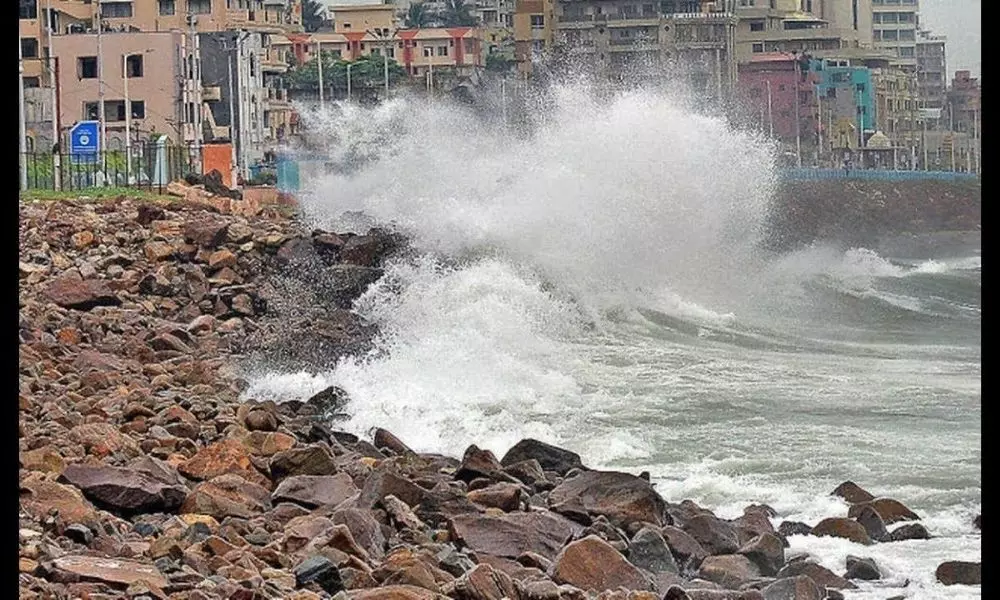Live
- INS Kuthar makes maiden visit to Gopalpur Port
- PM praises city-based NGO for promoting libraries
- Odisha police rescue ‘trafficked’ Bangla girl
- iPhone 16 Plus Now at Rs. 2,000 Discount on Amazon – Get It Today
- How Technology is Shaping Global Connectivity and Enhancing Security
- Dy CM directs officials to collect all critical info on caste census
- Naga Chaitanya Opens Up About His Wedding Plans with Sobhita Dhulipala
- ‘NC24’ First Look Poster: Naga Chaitanya’s Next Promises Thrills and Mythology
- Rumors Heat Up as Vijay and Rashmika Enjoy a Cozy Meal Together
- 67th annual day celebrations held at IRISET
Just In
AP yet to gear up for climate change impact


AP yet to gear up for climate change impact
Going by the 'Red alert' issued by the Intergovernmental Panel on Climate Change (IPCC)’s Sixth Report, Andhra Pradesh should be worried about the impact of climate change on its coastal towns.
Going by the 'Red alert' issued by the Intergovernmental Panel on Climate Change (IPCC)'s Sixth Report, Andhra Pradesh should be worried about the impact of climate change on its coastal towns.
In fact, this is not for the first time that the IPCC has sounded the warning. In its previous reports too, it has been assessed that climate change is bound to impact the seas and hence the coastal cities too.
The key difference that stands out now is that the earlier reports were looking at those 'disastrous' changes as happening a few decades later. Now, the situation has altered so drastically that the calamitous outcomes have drawn near. If 1.5 degrees Celsius change in the temperatures was thought of to be the extreme limit, the present assessment is talking about crossing the 2 degrees Celsius mark.
This should make Andhra Pradesh to wake up to the clear and present danger.
The United Nations Office for the Coordination of Humanitarian Affairs has been cautioning India's coastal regions, home to about 17 crore of the country's 140 crore people against the climate change impact. India is going to face the brunt because it is on the front lines of a shifting climate, experiencing sea-level rise, erosion, and natural disasters such as tropical storms and cyclones. The latest evidence of this vulnerability occurred in May 2020, as the strongest storm recorded in decades in the Bay of Bengal-Cyclone Amphan-hit, forcing several million people to evacuate.
Andhra Pradesh is just not prepared to face the slow-change hurtling towards it speedily now. Sure, it requires a national level policy, but given the complex politics, it may not be easier for the Centre to evolve a unified policy. The state faces the double threat of floods and rising sea levels due to the climate change the report has warned.
There is another problem confronting the government: The Centre refuses to divulge the High Tide Lines. Accurately mapping the High Tide Line is important because it forms the baseline for Coastal Zone Management Plans prepared by state authorities for coastal districts.
It is essential for the government to protect the coast, for industry to secure its coastal zone clearances and for people living along the shores to safeguard their livelihoods. The plans, which regulate the activities in the area up to 500 metre from the High Tide Line, are under revision. Centre has its own reasons for not alerting the people to the danger of tidal waves accurately.
Visakhapatnam has a population of more than 20 lakh as of now and its projected population growth rate stands at 2.35 per cent per year. With the AP government now planning to make it the executive capital of the state, its population could only shoot up further.
AP has to brace itself to the dangers of climate change and plan its moves accordingly.

© 2024 Hyderabad Media House Limited/The Hans India. All rights reserved. Powered by hocalwire.com






